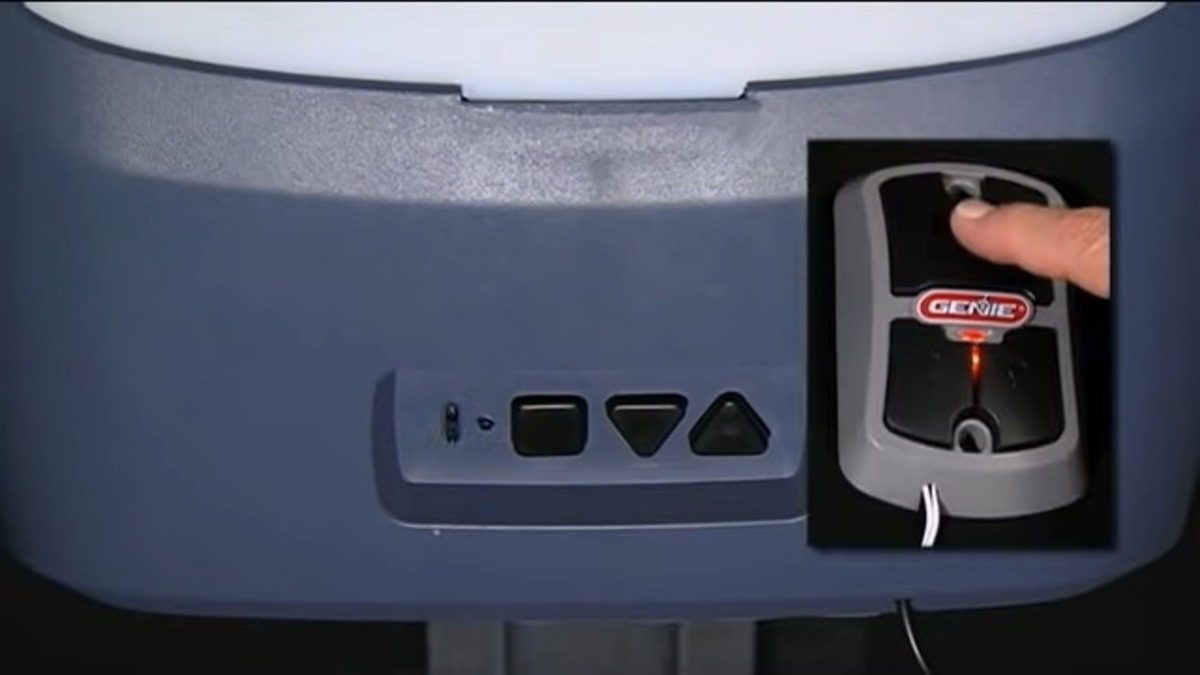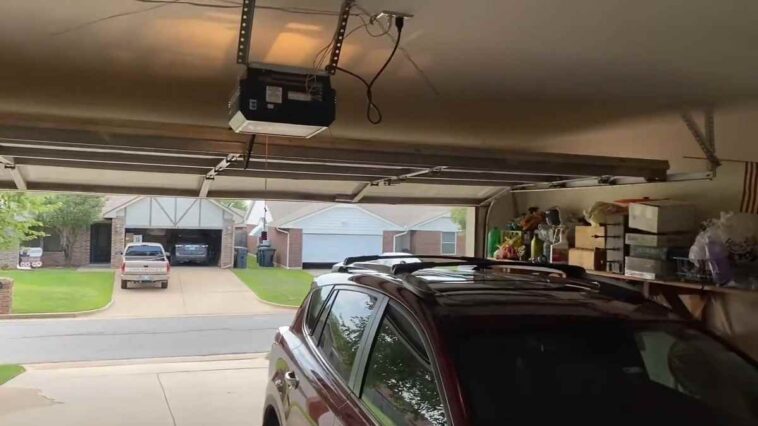Affiliate Disclosure: We may earn money or products from the companies mentioned in this post.
Genie has established itself as a trusted name among the many brands available in the market, known for its reliable and durable products. However, like any mechanical device, Genie garage door openers are not immune to occasional problems and malfunctions.
If you own a Genie garage door opener, you may have encountered some frustrating issues that hinder the smooth operation of your garage door. Whether it’s a malfunctioning remote control, a door that won’t open or close properly, or unusual noises during operation, these problems can disrupt your daily routine and compromise the security of your home.
The good news is that many of these common problems can be resolved without professional assistance. In this blog post, we will explore some of the most frequently encountered issues with Genie garage door openers and provide practical troubleshooting tips to help you get your garage door back in working order.
6 Common Problems With Genie Garage Door Openers
Like any mechanical device, Genie openers can experience issues that may disrupt their smooth operation. Dealing with these problems can be frustrating, especially regarding the security and convenience of your home.
1. Remote Control Malfunctions
One of the most common issues Genie opener owners faces is malfunctioning remote controls. If your remote fails to operate the garage door, start by checking the batteries. Replace them if necessary, ensuring they are correctly installed. If the issue persists, reprogram the remote following the manufacturer’s instructions.
Additionally, check for any interference from nearby electronic devices that may affect signal transmission.
2. Door Reverses Before Closing
If your Genie garage door opener starts closing but immediately reverses back up, it indicates a safety sensor problem. Start by inspecting the sensors located near the bottom of the door tracks. Ensure they are aligned properly, clean from debris, and free from obstructions.
If the problem persists, inspect the sensor wiring for any damage or loose connections. Adjusting the sensor alignment and fixing any wiring issues should resolve this problem.
3. Noisy Operation
Unusual or excessive noise during the operation of a Genie garage door opener can be a nuisance. To address this problem, lubricate moving parts such as hinges, rollers, and tracks. Use a silicone-based lubricant for smooth and quiet operation.
Don’t forget to check for loose hardware, such as nuts, bolts, and screws, and tighten them if necessary. If the noise persists, it may indicate worn-out parts, and you may need to consult a professional for further assistance.
4. Door Doesn’t Respond to Wall Button
If the garage door doesn’t respond when you press the wall button, there might be an issue with the wiring or the button itself. Start by checking the wiring connections between the wall button and the opener unit. Make sure the connections are secure and free from damage.
If the wiring is intact, replace the wall button to rule out defects. Ensure you follow the manufacturer’s instructions while installing the new button.
5. Door Gets Stuck While Opening or Closing
If your Genie garage door opener gets stuck while opening or closing, it could indicate an issue with the door’s balance or the opener’s force settings. First, check for any obstructions along the door’s track that may be causing it to jam. If the track is clear, adjust the force settings on the opener unit following the manufacturer’s instructions.
You may need to increase or decrease the force to ensure smooth operation. If the problem persists, consider contacting a professional to inspect the door’s balance and alignment.
6. Opener Motor Runs, but Door Doesn’t Move
When the Genie opener’s motor runs, but the door fails to move, the problem might lie with the drive gear or carriage. Begin by inspecting the drive gear for any signs of wear or damage. If you notice any issues, replace the drive gear following the manufacturer’s instructions.
Additionally, check the carriage’s connection to the door. If it’s loose or damaged, it may prevent the door from moving. Tighten or replace the carriage as needed.
What Is the Lifespan of a Genie Garage Door Opener?

The lifespan of a Genie garage door opener can vary depending on several factors, including usage, maintenance, and model type. A well-maintained Genie garage door opener lasts 10 to 15 years.
Regular maintenance is crucial to prolonging the lifespan of a garage door opener. It is recommended to follow the manufacturer’s guidelines for maintenance, such as lubricating moving parts, checking the garage door’s balance, and ensuring proper alignment. These maintenance tasks help prevent premature wear and tear and ensure optimal performance.
The frequency of use also affects the lifespan of the garage door opener. A garage door opener frequently used, such as in a busy household or commercial setting, may have a shorter lifespan than one used less frequently.
The specific model of the Genie garage door opener can also impact its lifespan. Different models may have varying levels of durability and quality of components.
Do Garage Door Openers Use a Lot of Electricity?
Garage door openers do not use a significant amount of electricity. On average, a typical residential garage door opener consumes around 400-600 watts of power when it is actively opening or closing the door. However, this power usage is only for a brief period, usually lasting for a minute or less.
When the garage door opener is not in use, such as when the door is fully open or closed, it enters standby mode, consuming minimal power, usually in the 1-4 watts range. This low power consumption is similar to other household appliances in standby mode, such as televisions or computer monitors.
The garage door opener is not used for most of the day, so its overall energy consumption is relatively low. The impact on your electricity bill is likely minimal, especially when compared to other appliances like refrigerators or air conditioners that operate continuously.
How Do I Know if My Garage Door Opener Motor Is Bad?
They are designed to automate the process of opening and closing garage doors. However, garage door opener motors can experience issues like any mechanical device over time. Identifying when the motor is malfunctioning or showing signs of failure is essential.
- Unusual Noises: One of the first signs of a failing garage door opener motor is the presence of unusual noises during operation. If you notice grinding, scraping, or banging sounds when the motor is running, it could indicate a problem. These noises may suggest issues with the motor’s internal components, such as worn-out gears or loose parts. Ignoring these sounds may lead to further damage and potential failure of the motor.
- Slow or Inconsistent Operation: A properly functioning garage door opener motor should operate smoothly and consistently. A noticeable decrease in the speed at which your garage door opens, or closes could signal motor trouble. Additionally, if the door exhibits jerky movements or frequently stops and starts during operation, it may indicate a motor issue. In such cases, it is advisable to have a professional technician inspect the motor to determine the cause of the problem.
- Overheating: Garage door opener motors can generate heat during operation, but excessive heat is a cause for concern. If you notice that the motor feels excessively hot to the touch or emits a burning smell, it could indicate an overheating problem. Overheating can lead to motor failure and should be addressed promptly. Factors such as insufficient ventilation, worn-out motor components, or electrical issues can contribute to motor overheating.
- Failure to Respond to Remote or Wall Switch: When a garage door opener motor functions correctly, it should respond promptly to the remote control or wall switch commands. If you experience delays or no response when attempting to operate the door, it could suggest a problem with the motor. Before jumping to conclusions, check the batteries in your remote and ensure that the wall switch is working correctly. If the issue persists, the motor likely requires attention.
- Motor Doesn’t Stop Running: A malfunctioning motor may not stop running even after the garage door has opened or closed. This can be a safety concern, as an uncontrolled motor can lead to accidents or damage to the door. Suppose you notice that the motor continues to run even when the door is fully open or closed. In that case, it is advisable to seek professional assistance to diagnose and repair the motor.
What Type of Garage Door Opener Lasts the Longest?
When it comes to the longevity of garage door openers, a few types are known for their durability and long lifespan. One type that stands out is the belt drive garage door opener. Belt drive openers use a rubber belt to operate the door, providing a smooth and quiet operation. The rubber belt is typically reinforced with steel, making it resistant to stretching and wear. This type of opener is known for its reliability and can last many years with proper maintenance.
Another type of garage door opener known for its longevity is the screw drive opener. Screw drive openers utilize a threaded steel rod to move the door. They have fewer moving parts than other types of openers, reducing the chances of component failure. Screw drive openers are also less prone to wear and tear, making them a durable choice that can last long.
Conclusion
Genie garage door openers, like any other technology, are not immune to problems. However, by being aware of common issues and understanding how to troubleshoot them, you can save yourself time, money, and frustration.
One of the most frequent problems with Genie garage door openers is the malfunctioning of the remote control. This can be resolved by ensuring the remote is within range, replacing the batteries, or reprogramming it. Additionally, issues with the safety sensors can prevent the door from closing or cause it to reverse unexpectedly. Regularly cleaning and aligning the sensors can help alleviate this problem.


